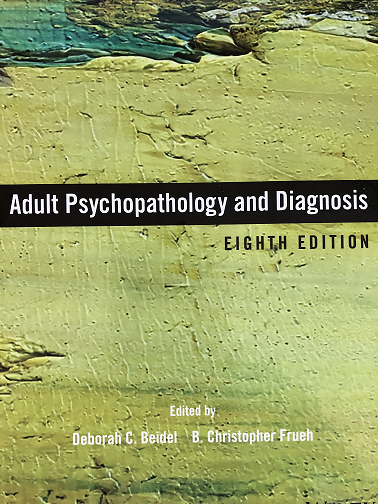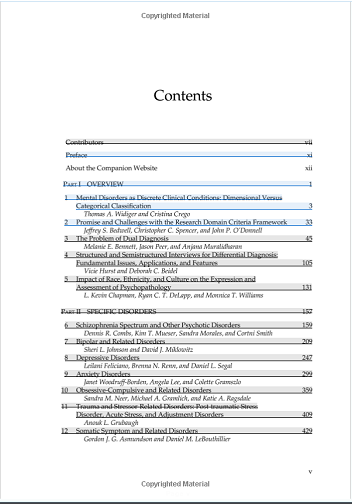I’m Dr. Kevin Chapman
Licensed Clinical Psychologist
Dr. Chapman is a diplomate and certified by the Academy of Cognitive and Behavioral Therapies (academyofct.org)
About Me
Additionally, Dr. Chapman served as the consultant for the 3rd edition of the Managing Social Anxiety clinician manual and client workbook as part of the Treatments that Work series. Dr. Chapman serves on several editorial boards in addition to serving on the board for the Andrew Kukes Foundation for Social Anxiety and the Scientific and Clinical Advisory Board for the International OCD Foundation. Dr. Chapman also serves on the Coalition or the Application and Advancement of Psychological Science (CAAPS) Psychology Media Expert Panel for his work with anxiety disorders. Dr. Chapman regularly appears on numerous national and regional media outlets for his clinical work with anxiety disorders. Dr. Chapman is a recent recipient of the Anxiety and Depression Association of America (ADAA) Jerilyn Ross Clinician Advocate Award.

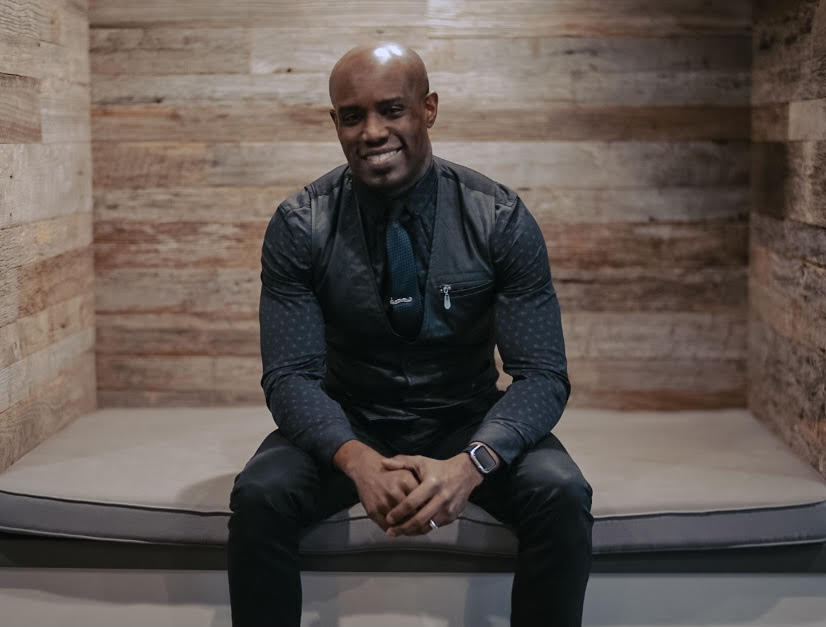
PUBLICATIONS
Peer Reviewed Journal Articles
Williams, M. T., Chapman, L. K., Simms, J. V., & Tellawi, G. (2017). Cross-cultural phenomenology of obsessive-compulsive disorder. In J. Abramowitz, D. McKay, & E. Storch (Eds.), The Wiley Handbook of Obsessive-Compulsive Disorders (p. 56-74). Wiley. ISBN: 978-1-118-88964-0
Chapman, L. K., & DeLapp, C. T. R. (2015). Nine-session treatment of a blood-injection-injury phobia with manualized cognitive-behavioral therapy: An adult case example. Clinical Case Studies.
Chapman, L.K., DeLapp, C.T.R., & Williams, M. T. (2015). Cognitive-Behavioral Treatment of Social Anxiety among Ethnic Minority Patients, Part 1: Understanding Differences. Directions in Psychiatry, 33(3), 151-162.
Chapman, L. K., DeLapp, C.T.R., & Williams, M.T. (2015). Cognitive-Behavioral Treatment of Social Anxiety among Ethnic Minority Patients, Part 2: Bridging the Gap in Treatment. Directions in Psychiatry, 33(3), 163-176.
Lyle, K. L., Chapman, L. K., & Martin, J. (2013). Is Handedness Related to Anxiety? New Answers to an Old Question. Laterality: Asymmetries of Body, Brain and Cognition, 18(5), 520-35.
Williams, M. T., Tellawi, G., Wetterneck, C. T., & Chapman, L. K. (2013). Recruitment of Ethnoracial Minorities for Mental Health Research. The Behavior Therapist, 36 (6), 151-156.
Petrie, J., Chapman, L. K., & Vines, L. (2013). The clinical utility of the Positive and Negative Affect Scales-Extended Version (PANAS X) in predicting anxiety disorders in African American adults: A receiver operating characteristic analysis. Journal of Black Psychology, 39 (2), 131-155.
Chapman, L. K., Petrie, J., & Vines, L. (2012). The factor structure of the SCL-90 in a community-based sample of African American adults. Psychiatry Research, 199, 2, 140-144.
Mendoza, D. B., Williams, M., Chapman, L. K., & Powers, M. (2012). Minority inclusion in randomized clinical trials of panic disorder. Journal of Anxiety Disorders, 26(5), 574-582.
Williams, M. T., Chapman, L. K., Wong, J., & Turkheimer, E. (2012). The role of ethnic identification in symptoms of anxiety and depression. Psychiatry Research, 199, 31-36.
Chapman, L. K. (2012). Foreword: Anxiety assessment and treatment in ethnic minority adults and children. Journal of Anxiety Disorders, 26 (4), 487.
Owen, J. J., Chapman, L. K., Quirk, K., Inch, L. J., France, T., & Bergan, C. (2012). Processes of change in relationship education for lower-income African American couples. Journal of Couple and Relationship Therapy, 51-68.
Chapman, L. K., Petrie, J., Vines, L., & Durrett, E. (2012). The Co-occurrence of Anxiety Disorders in African American Parents and Their Children. Journal of Anxiety Disorders, 26, 65-70.
Chapman, L. K., Vines, L., & Petrie, J. (2011). Fear factors: Cross validation of specific phobia domains in a community-based sample of African American adults. Journal of Anxiety Disorders, 25(4), 539-544.
Chapman, L. K., & Steger, M. F. (2010). Race and religion: Differential prediction of anxiety symptoms by religious coping in African American and European American young adults. Depression and Anxiety, 27, 316-322.
Chapman, L. K., & Woodruff-Borden, J. (2009). The impact of family functioning on anxiety symptoms on African American and European American young adults. Personality and Individual Differences, 47, 583- 589.
Chapman, L. K., Williams, S. R., Mast, B. T., & Woodruff-Borden, J. (2009). A confirmatory factor analysis of the Beck Anxiety Inventory in African American and European American young adults. Journal of Anxiety Disorders, 23, 387-392.
Chapman, L. K., Kertz, S. J., & Woodruff-Borden, J. (2009). A structural model analysis of psychological distress and perceived control on worry in among African American and European American young adults. Journal of Anxiety Disorders, 23, 69-76.
Chapman, L. K., Kertz, S. J., & Zurlage, M., & Woodruff-Borden, J. (2008). A confirmatory factor analysis of specific phobia domains in African American and Caucasian American young adults. Journal of Anxiety Disorders, 22 (5), 763-771.
Harvison, K. W., Chapman, L. K., Ballash, N. G., & Woodruff-Borden, J. (2008). Anxiogenic patterns in mother-child interactions.Child and Family Behavior Therapy, 30(2), 137-152.
Kertz, S. J., Smith, C. L., Chapman, L. K., & Woodruff-Borden, J. (2008). Maternal sensitivity and anxiety: Impact on child outcome. Child and Family Behavior Therapy 30 (2), 153-171.
Wilson, S. P., Kipp, K., & Chapman, L. K. (2004). Limits of the retrieval inhibition construct: List segregation in directed-forgetting. The Journal of General Psychology, 130(4), 359-379.
Books and Book Chapters
Chapman, L. K., DeLapp, R., & Richards, A. (2015). Assessment of Generalized Anxiety Disorder, Panic, and Phobias with African Americans, Chapter 9. In L. T. Benuto & B. Leany (Eds.), Guide to Psychological Assessment with African Americans (pp. 121-144). New York, NY: Springer. ISBN: 978-1-4939-1003-8. doi: 10.1007/978-1-4939-1004-5_9
Chapman, L.K., DeLapp, R, & Williams, M.T. (2014). Impact of Race, Ethnicity, and Culture on the Expression and Assessment of Psychopathology. In Adult Psychopathology and Diagnosis, 7e, D.C. Beidel & B.C. Frueh, ed. John Wiley & Sons, Inc.
Meyer, B., Chapman, L. K., & Weaver, C. (2009). Case studies in Abnormal Behavior (8th ed.). Boston: Allyn & Bacon.
Madson, M. B., Chapman, L. K., Wood-Barcalow, N., & Williams-Nickelson, C. (2005). (Eds.). Succeeding in practicum: An APAGS resource guide. American Psychological Association, Washington, D.C.
Chapman, L. K., Williams, M., & DeLapp, R.C.T. (to appear). Impact of race, ethnicity, and culture on the expression and assessment of psychopathology. In Adult Psychopathology (8th ed.). D. Beidel and C. B Frueh. Hoboken, NJ: Wiley.
Williams, M. T., Chapman, L. K., Simms, J. V., & Tellawi, G. (to appear). Cross-Cultural Phenomenology of Obsessive-Compulsive Disorder. In Storch, E., Abramowitz, J., & McKay, D. Handbook of Obsessive Compulsive Related Disorders.
Williams, M. T., Chapman, L. K., Buckner, E., & Durrett, E. (2016). Cognitive Behavioral Therapy. In A. Breland-Noble, C. S. Al-Mateen, & N. N. Singh (Eds.), Handbook of Mental Health in African American Youth. Springer. ISBN: 978-3-319-25501-9.

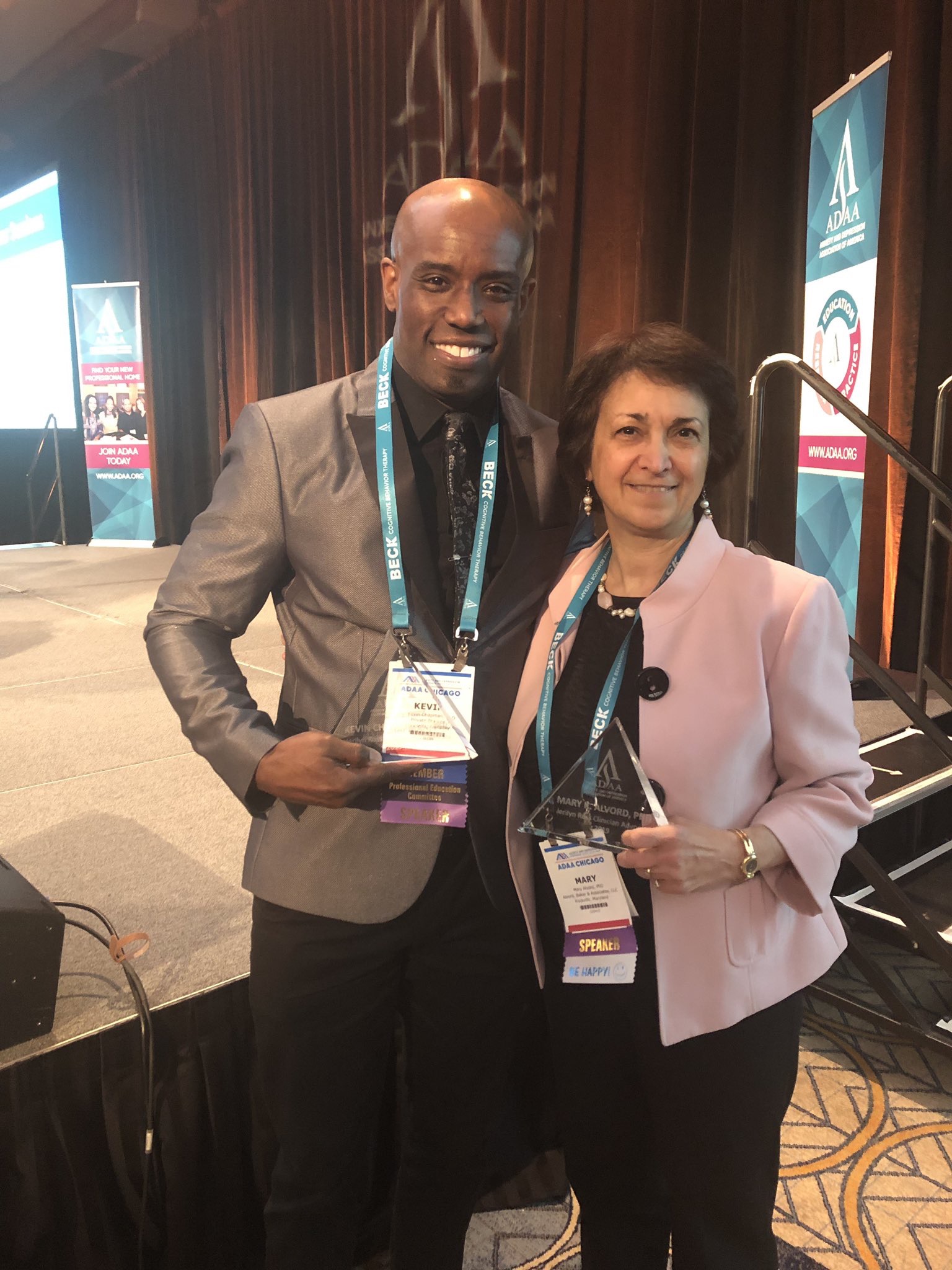
Dr. Chapman is the recipient of the 2019 ADAA Jerilyn Ross Clinician Advocate Award
To honor the memory and lifework of Jerilyn Ross, ADAA’s cofounder and president from 1985 to 2010, this award acknowledges a professional who exemplifies excellence and outstanding advocacy for patient education and care, training, and research. The recipient is recognized at the Opening Session of the annual conference and presented with a plaque.

Psychology Expert Media Panel
Dr. Chapman was added to the “Psychology Expert Media Panel” by CAAPS for his work with “Adult Anxiety”: as someone who can provide the best possible commentary on the state of the scientific literature in this area. CAAPS is a leading authority in the science and practice of psychology.


Dr. Chapman is a Clinical Advisor for nocd, an innovative app to assist you in treating your symptoms of OCD on the go.
Helping You Achieve Success
Unlock Your Full Potential
Dr. Chapman is an Approved Mentor of the Association for Applied Sports Psychology (AASP) for those aspiring to practice in the field of Sports Psychology.
Dr. Chapman is the Founder and Director of KY-CARDS
Dr. Chapman is considered a thought leader and a subject matter expert as it relates to anxiety disorders. He is an internationally recognized expert in the assessment and treatment of anxiety and related disorders and his work has gained significant media attention where he regularly engages in public education through various national and international media platforms including Bloomberg Business Week, USA Today, the Wall Street Journal, and many others. Similarly, Dr. Chapman serves as a consultant for major media networks and production companies, providing insights related to the management of anxiety and related disorders and the implementation of cognitive behavioral therapy. Additionally, Dr. Chapman is a scholar, serving on various editorial boards for scientific journals and treatment manuals including the Oxford Press Treatments that Work series. A former two-sport collegiate athlete, Dr. Chapman also specializes in sports performance and athlete mental health, serving as a mental health expert for Truesport, a subsidiary of the US Anti-Doping Agency.
Clinical Experience
Dr. Chapman is an internationally recognized expert in the treatment of anxiety and related disorders and cognitive behavioral therapy. Dr. Chapman is a diplomate and certified by the Academy of Cognitive and Behavioral Therapies. Dr. Chapman’s areas of specialty include social anxiety, phobias, worry, panic, OCD, agoraphobia, tic disorders, BFRB, PTSD, and sports performance enhancement.
Dr. Chapman serves on the Scientific and Clinical Advisory Board for the International Obsessive and Compulsive Disorder Foundation (IOCDF) in recognition of his expertise in the assessment and treatment of OCD: https://iocdf.org/scientific-and-clinical-advisory-board/
Education
Dr. Chapman completed his undergraduate studies at Centre College in Danville, KY, where he majored in psychology with a minor in sociology. He received a Master of Science in clinical psychology from Eastern Kentucky University in 2002 where he received training in evidenced-based treatment of anxiety and related disorders. Dr. Chapman obtained a Doctor of Philosophy (Ph.D.) in Clinical Psychology from the University of Louisville in Louisville, KY in 2006 where he received further training in evidenced-based treatment of anxiety and related disorders.

Dr. Chapman is fully licensed to practice psychology in both Kentucky and Colorado.
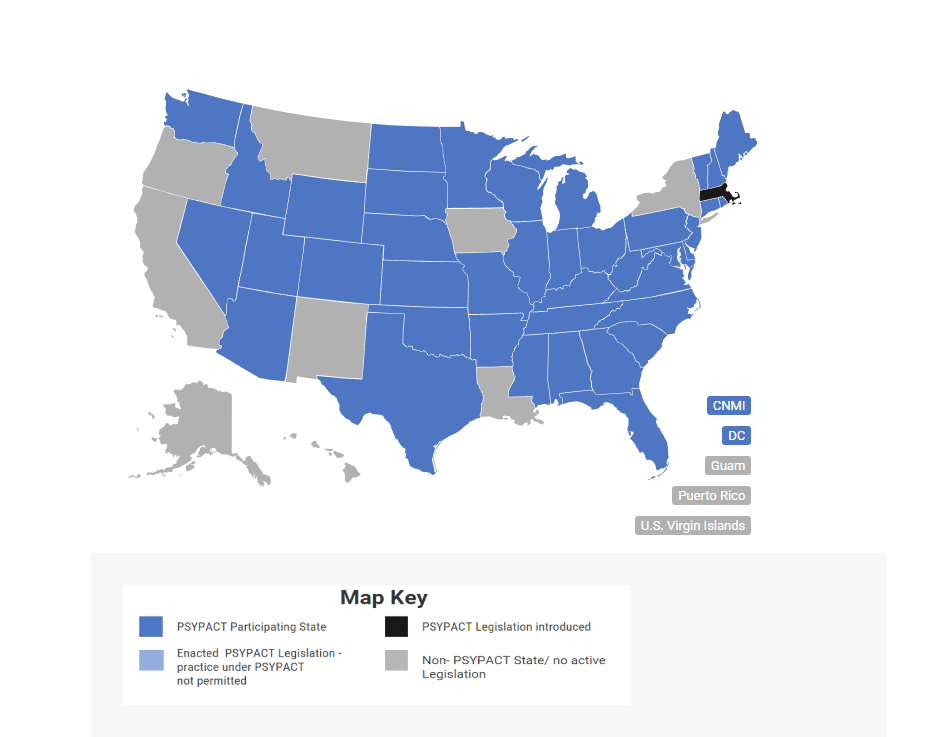
Dr. Chapman has met all of the requirements for the Authority to Practice Interjurisdictional Telepsychology (APIT) and has been granted the authority to practice telepsychology under the authority of PSYPACT in PSYPACT participating states. For a list of current PSYPACT participating states, please visit the PSYPACT website at https://www.psypact.org/
3.1%
Of people have Generalized Anxiety Disorder (GAD) in the U.S. population. Women are twice as likely to be affected as men.
6.8%
Social Anxiety Disorder effects this percentage of both men and women, typically beginning around age 13.
6.7%
While Major Depressive Disorder can develop at any age, the median age at onset is 32.5 years old.
25%
Equally common among men and women, Obsessive-Compulsive Disorders (OCD) median age of onset is 19, with this percentage of cases occurring by the age of 14.
Rapid Relief, Lifelong Change!
“With Dr. Chapman’s guidance, knowledge, patience and his well thought out program, I can state that I would recommend Dr. Chapman and his CBT program to anyone suffering from any types of anxiety, depression, panic, and/or OCD symptoms. I have partaken in therapy treatments such as Psychiatry, various medication regiments, and even hypnosis, none of which found to be as successful as the CBT treatment provided by Dr. L. Kevin Chapman. My life feels renewed and I owe it all to Dr. Chapman!”



